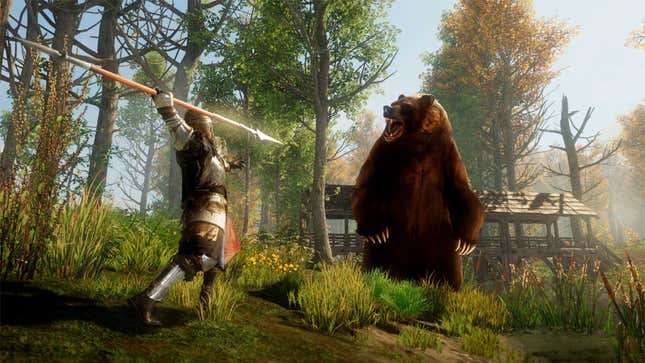
You may know it as the Everything Store. But there’s one chunk of “everything” Amazon has failed to crack: video games. A new report from Bloomberg’s Jason Schreier and Priya Anand sheds light on why Amazon Game Studios, backed by one of the planet’s biggest companies, can’t seem to make a successful video game.
The details, based on interviews with more than 30 current and former Amazon employees, paint an apparent picture we know all too well. An out-of-touch company throws money at an ambitious project. Executives refuse to listen to rank-and-file staff. Higher-ups institute draconian policies that hamper workflow, rather than aid it. You’d think these companies would get the memo by now.
Today’s purported story out of Amazon, in particular, is like one big case of Bad Video Game Development Yahtzee:
- Initial designs for the game New World—in which you play as a colonist in a fictionalized 17th-century America—featured enemy designs that bore an uncomfortable similarity to Native Americans. Per Bloomberg, Amazon “hired a tribal consultant who found that the portrayal was indeed offensive.” New World, which was initially slated for an August 2020 release, is now planned for a spring 2021 release.
- Developers at Amazon Game Studios were forced to use a proprietary development tool called Lumberyard. (You may have read about this in a piece of similarly excellent reporting by Wired’s Cecilia D’Anastasio from last October.) In 2018, Amazon brought on Christoph Hartmann, a Take-Two veteran, as vice president of game studios. He eased the “mandate” that forced everyone to use Lumberyard.
- “Bro Culture” is reportedly pervasive at Amazon’s game development studios. One woman told Bloomberg that, following a disagreement with a male member of senior leadership, he made up some new positions above her and hired men into those roles.
- Amazon on-boarded storied developers who worked on popular series like Portal and Far Cry. Of them, just one remains.
- The leader of the entire games division, Mike Frazzini, had never made a video game before. He’d reportedly frustrated developers with basic takes and had trouble differentiating between gameplay and concept footage.
- Rather than designing new concepts, Amazon pushed to create takes on other popular games. A project called Nova, inspired by League of Legends, was cancelled in 2017. One called Intensity, sparked by Fortnite’s staggering success, was binned in 2019. And then there’s the ill-fated, Overwatch-like Crucible, which face-planted so hard it was released and then un-released last year.
- Amazon Luna, the company’s foray into the hot games-on-demand space, doesn’t even fall under the gaming division. It’s run by David Limp, who helms Amazon’s devices division (responsible for physical products like the Kindle and the Echo).
If you’re aching for another tale of stubborn misdirection and misguided decision-making in the video game industry, Bloomberg’s look behind the scenes at Amazon Game Studios is worth reading in full.